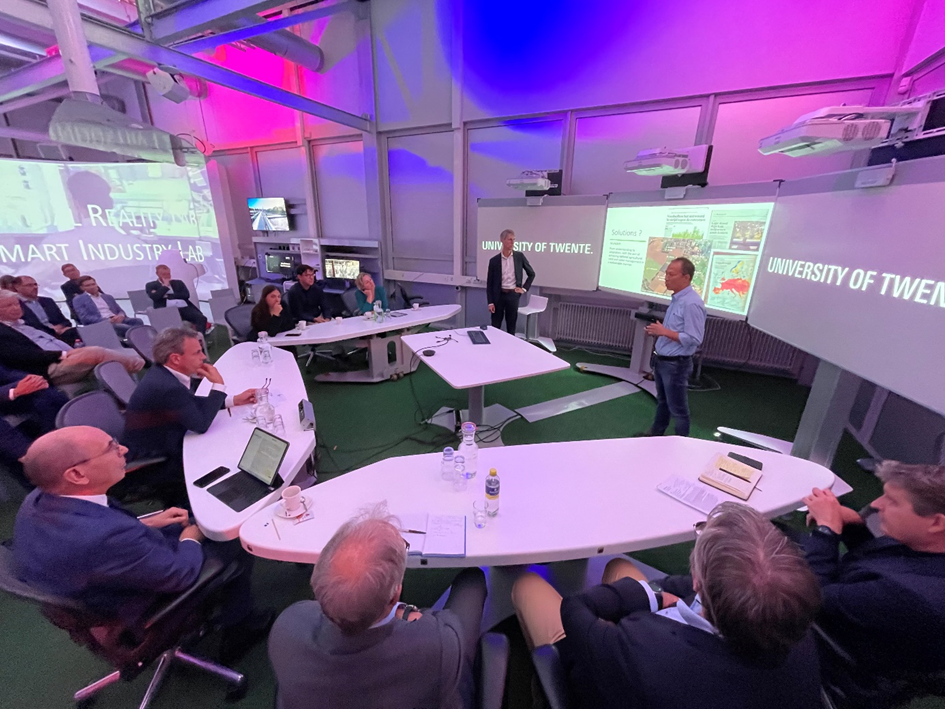UT researcher Yijian Zeng, from the Department of Water Resources at the ITC Faculty, has been elected as the Co-Chair of the International Soil Modelling Consortium (ISMC). For the coming three years, he will work together with top soil scientists towards an open “Soil Digital Twin”, contributing to EU Soil Strategy for 2030 that aims to achieve healthy soils, which is at the heart of Europe’s twin green and digital transition.
ISMC - International Soil Modelling Consortium
Soil is one of the most critical life-supporting compartments of the biosphere, that provides us with numerous ecosystem services with food, biomass and fibers, and raw materials. Soil regulates the water, carbon, and nutrient cycles, provides a habitat for biodiversity, and makes life on land possible. Despite the many important functions of soil, it’s been estimated that about 60 to 70% of soils in the EU are not healthy, and many fundamental knowledge gaps remain.
Researchers have developed many soil models for assessing different soil functions and services over different scales, and estimating the costs and benefits of land management on soil degradation, thereby informing policy on medium and long-term costs of soil management scenarios. The challenge lies in bringing together the experience and expertise of researchers in soil modeling, soil ecosystem functions and services, and the socio-economic methods for resource evaluation, and for sharing data and knowledge with related Earth system science disciplines. The ISMC consortium will contribute to bridging the above gaps, by improving our understanding of climate-change–feedback processes, connecting basic soil science research with management, and facilitating the communication between science and society.
“The concept of an open Digital Twin, based on an open, flexible, and secure cloud-based computing system (like CRIB), is crucial here to address these challenges,” according to Dr. Yijian Zeng. “The open Soil Digital Twin helps to monitor and predict the impact of climate extremes on soil functioning, which can be used to recommend measures and policies to increase the resilience of soil systems to climate-related challenges.”
EU Soil Strategy for 2030: Achieving Good Soil Health by 2050
The new EU soil strategy for 2030 intends to address land degradation in a comprehensive way, aiming to achieve all EU soil ecosystems in a healthy condition by 2050. This strategy closely relates to climate mitigation, circular economy, biodiversity, desertification, soil restoration, soil monitoring, and citizen engagement to enable the transition to healthy soil. The core of the strategy is the concept of soil health, the quantification of which needs to be substantiated by measurable indicators based on hard facts and data.
Healthy Soil for Healthy Life: Food Forest in the Netherlands
The consecutive hot and dry summers of past years have made the Dutch agricultural sector suffer the loss, for which Droogteschade Nederland (DNL) has initiated a legal framework for compensation to farmers for drought damage and will initiate a collective lawsuit for the settlement of this drought damage. The Earth Observation data have suggested that food forestry is highly resilient to droughts since such a forest system boots soil health and improves water infiltration, water holding capacity, and carbon sequestration. During the visit of Minister Mark Harbers of Infrastructure and Water Management to UT, Dr. Yijian Zeng presented the potential of the food forest as a nature-based solution to combat droughts, which are under investigation in ongoing projects WUNDER and EcoExtreML. Dr. Zeng argued that it is crucial however to consider the long-term aspects of such a solution, as food forestry needs some upfront investment in the first 3 to 5 years when there is no profit. The Minister expressed awareness of the potential of agroforests and the possibility of introducing measures to support the transitional costs for farmers willing to shift to this innovative way of farming.

More recent news
 Fri 12 Dec 2025Retrospective of the UT Climate Event 2025
Fri 12 Dec 2025Retrospective of the UT Climate Event 2025 Fri 5 Dec 2025Transforming urban policy for a healthier and safer Enschede (and other cities)
Fri 5 Dec 2025Transforming urban policy for a healthier and safer Enschede (and other cities) Fri 28 Nov 2025ITC PhD Publication Award 2025 Ceremony
Fri 28 Nov 2025ITC PhD Publication Award 2025 Ceremony Mon 10 Nov 2025Dutch spinoff launches groundbreaking global flood forecasting tool
Mon 10 Nov 2025Dutch spinoff launches groundbreaking global flood forecasting tool Wed 5 Nov 2025New Geoversity course on Geospatial Auditing launched in collaboration with the Netherlands Court of Audit
Wed 5 Nov 2025New Geoversity course on Geospatial Auditing launched in collaboration with the Netherlands Court of Audit

